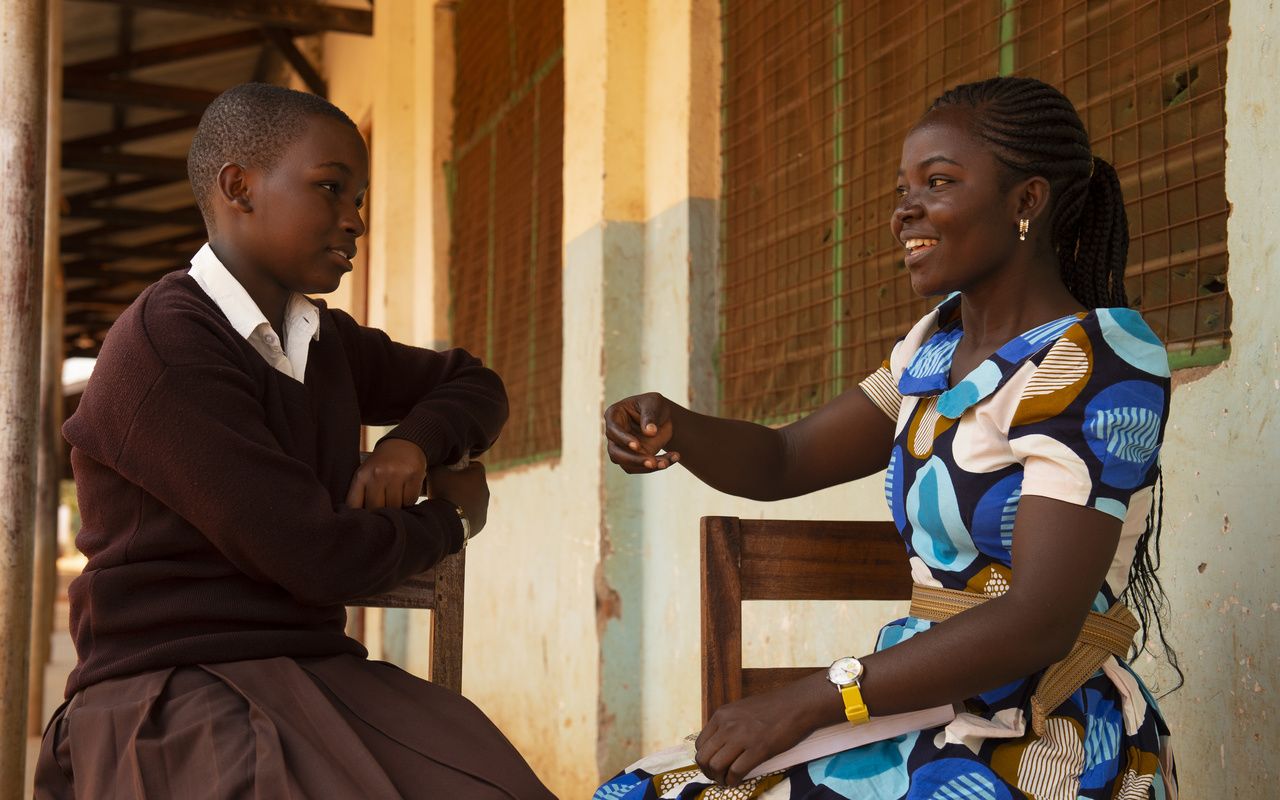

New research initiative to influence global policy and funding priorities to support girls’ education in sub-Saharan Africa

CAMFED (the Campaign for Female Education) and the Research for Equitable Access and Learning (REAL) Centre at the Faculty of Education, University of Cambridge, have announced a new partnership to examine how community-led interventions that target the needs of the most marginalised children can be scaled through education systems in Tanzania and in other countries in sub-Saharan Africa.
The new collaboration was announced at the ‘Creating an Equitable Future Through Education’ conference held at Jesus College on Thursday (7 October), an international gathering held to spotlight the Yidan Prize community and discuss the global challenges facing education today, considering the inequalities exposed by the pandemic and the disruption exacerbated by climate change.
In particular, the research will focus on the role of the Learner Guide: a recent female school graduate who volunteers in her local school to mentor girls, support catch-up learning among marginalised children, and deliver a self-development and wellbeing curriculum. The research will also explore ways in which the Learner Guide role can contribute to shifting social norms in school communities in relation to girls’ education. It will provide valuable new evidence about how we can build towards an equitable future through education.
"Supporting marginalised girls through education means looking beyond just numbers; we need to focus on breaking down the power dynamics and discrimination that they face every day."
Professor Pauline Rose, Director of the REAL Centre
Angeline Murimirwa, CAMFED Co-Executive, said: “We need to apply a gender and equity lens to all solutions we come up with. Let us prioritise investment in programmes that lift up the most marginalised. This research is fundamental in demonstrating how successful models can be scaled up to support girls’ education.”
Professor Pauline Rose, Director of the REAL Centre, said: “Supporting marginalised girls through education means looking beyond just numbers; we need to focus on breaking down the power dynamics and discrimination that they face every day. This affects not only their education opportunities, but also stifles their opportunities to thrive and build their future.”
The research will build on the collaboration between the REAL Centre and CAMFED to date, including in the area of cost-effectiveness analysis. Based on analysis of CAMFED’s data, the REAL Centre was able to show that a focus on the education needs of the most marginalised produced an uplift in the outcomes of all children: for every $100 spent per girl, per year, CAMFED's programme resulted in learning gains equivalent to an additional two years of education for all girls and boys at the schools where it operated.
“I cannot underscore enough the power of CAMFED’s model — the power of a sisterhood of 178,000 change leaders, supporting each other, contributing to more equitable policies, and addressing the structural inequalities that are keeping girls and young women from reaching their full potential.”
Julia Gillard, 27th Prime Minister of Australia
and former Chair, Global Partnership for Education
The Equitable Future conference brought together policymakers, educationalists, business leaders, foundation heads, leading academics, students and activists, with lively participation in person and online. The Hon Julia Gillard AC, 27th Prime Minister of Australia and former Chair of the Global Partnership for Education, and Princess Laurentien, UNESCO Special Envoy on Literacy for Development, and Board Director, Yidan Prize Foundation, delivered keynote addresses.
Major themes included the vulnerability of girls to exclusion from education in times of economic, climate and health crises, and the critical role of data in education development, building new bridges between the worlds of research and practice, and strengthening the evidence base for concerted global investment in education systems.
Julia Gillard strongly emphasised the importance of data to bring attention to the scale of the problem. She underscored the need to examine closely the continuing ‘white saviour’ narratives and power dynamics in international development, a theme picked up by Alicia Herbert OBE, Director of the Education, Gender and Equality Directorate at the Foreign, Commonwealth & Development Office, who expanded on deepening inequalities and the call to action by the Black Lives Matter movement.
Both highlighted the need to recognise and respect the expertise inherent in communities, citing CAMFED’s model of grassroots leadership by young women once at the margins of society. In his summary remarks, Professor Sir Leszek Borysiewicz, former Vice Chancellor of the University of Cambridge and Board Director, Yidan Prize Foundation, called for objective data, partnerships and action.
Following the conference, the Yidan Prize Foundation hosted an evening celebrating CAMFED Co-Executives Lucy Lake and Angeline Murimirwa as 2020 Laureates of the Yidan Prize for Education Development at the Fitzwilliam Museum in Cambridge. In his welcoming remarks, Professor Stephen Toope, Vice-Chancellor of the University of Cambridge, announced the new partnership, noting its importance in particular because of the impact that COVID-19 has had on the education of children from marginalised communities. Professor Toope added that collaborations such as those between the REAL Centre and CAMFED offered “a note of hope” in the context of such challenges. He added: “One of their great achievements has been to provide a sense of direction: principles and models that improve our chances of fulfilling that goal.”
Speaking at the celebration, Julia Gillard summarised, “I cannot underscore enough the power of CAMFED’s model of women’s leadership — the power of a sisterhood of 178,000 change leaders, supporting each other, contributing to more equitable policies, and addressing the structural inequalities that are keeping girls and young women from reaching their full potential.”
Image: Sophia (right), a CAMFED Learner Guide, with secondary student Hanipha, whom she supports at school.
Location: Morogoro, Tanzania
Photo credit: CAMFED/Eliza Powell